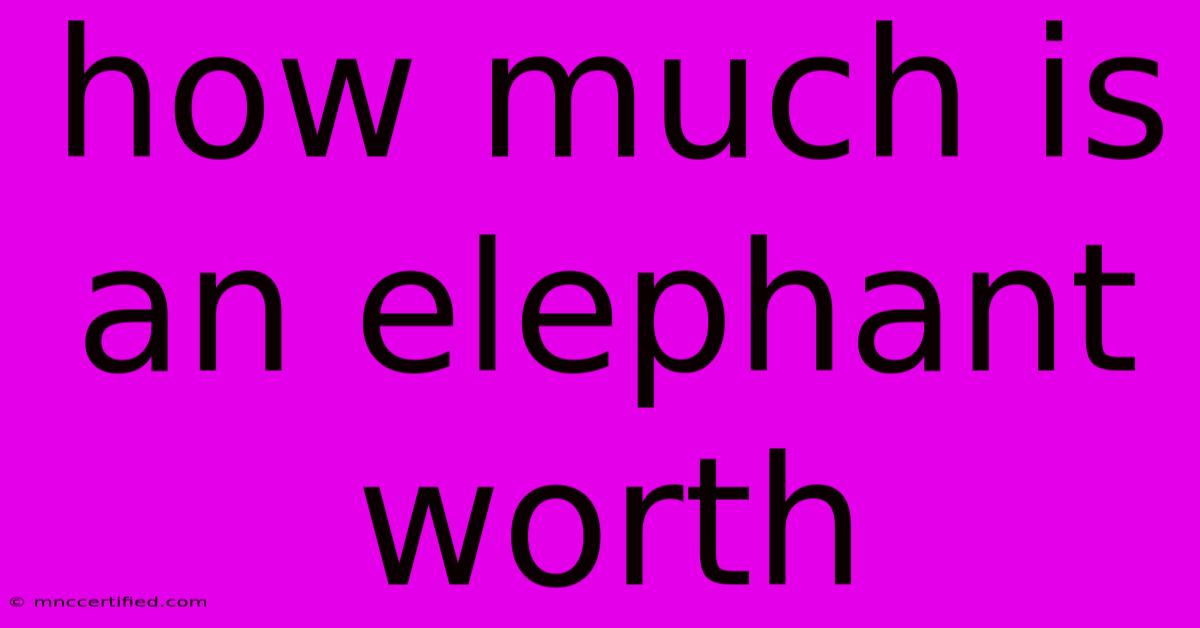How Much Is An Elephant Worth

Table of Contents
How Much is an Elephant Worth? A Complex Question with No Easy Answer
Determining the monetary value of an elephant is far more complicated than simply assigning a dollar figure. While you might find prices for elephant ivory (illegally traded, of course) on the black market, the true worth of an elephant extends far beyond any potential financial gain from poaching or exploitation. This article explores the various ways we can assess an elephant's value, highlighting its economic, ecological, and intrinsic worth.
The Economic Value of an Elephant
While illegal, the black market price of ivory significantly influences the perception of an elephant's economic worth, tragically driving poaching. However, a more holistic view considers the elephant's contribution to ecotourism.
-
Ecotourism: Elephants are a major draw for tourists in many African and Asian countries. National parks and reserves charge entrance fees, generating revenue for conservation efforts and local communities. The loss of a single elephant can severely impact this revenue stream, indirectly impacting local economies. This indirect economic value is substantial and difficult to quantify precisely.
-
Ecosystem Services: Elephants play a crucial role in maintaining their ecosystems. Their foraging habits contribute to seed dispersal, impacting plant diversity and forest regeneration. Their impact on water resources and nutrient cycling are also essential for the overall health of the environment. Estimating the monetary value of these ecosystem services is a complex task requiring advanced ecological modeling.
The Challenges of Assessing Economic Value
Accurately calculating an elephant's economic value is incredibly challenging. Factors such as:
- Variability in tourism revenue: This depends on many things beyond elephant populations, like tourism infrastructure and marketing efforts.
- Difficulty in quantifying ecosystem services: Advanced ecological models are needed to adequately value their contributions.
- Regional differences: The economic impact of elephants varies drastically depending on their location and the specific ecosystems they inhabit.
The Ecological Value: Beyond Dollars and Cents
The ecological value of elephants is immense and arguably surpasses any economic valuation. They are keystone species, meaning their presence is vital for maintaining the balance of their ecosystems.
- Habitat Creation and Maintenance: Elephants create and maintain habitats for other species through their foraging and water-seeking behaviors.
- Seed dispersal: Their role in seed dispersal is crucial for forest regeneration and biodiversity.
- Nutrient cycling: Elephants contribute significantly to nutrient cycling through their waste.
Without elephants, entire ecosystems could collapse, leading to widespread biodiversity loss and environmental instability. This ecological value is immeasurable in purely monetary terms.
The Intrinsic Value: Inherent Worth Beyond Monetary Terms
Beyond economic and ecological worth, elephants hold significant intrinsic value. Their intelligence, social complexity, and emotional depth are all reasons why their preservation is morally imperative. This intrinsic value should never be disregarded.
- Sentient Beings: Elephants demonstrate high levels of intelligence, empathy, and social bonding. Their capacity for suffering and emotional complexity demands ethical considerations beyond any financial assessment.
- Conservation Ethic: Protecting elephants is a moral imperative, reflecting humanity's responsibility to protect endangered species and biodiversity. This intrinsic value transcends any economic consideration.
Conclusion: A Multifaceted Valuation
The question of "how much is an elephant worth?" ultimately has no single answer. While attempting to quantify their economic contributions is important for conservation funding and policy, it's crucial to acknowledge their invaluable ecological role and intrinsic worth. Protecting elephants requires a multi-faceted approach recognizing the profound impact they have on ecosystems, economies, and our collective conscience. Their true value far surpasses any monetary figure.

Thank you for visiting our website wich cover about How Much Is An Elephant Worth. We hope the information provided has been useful to you. Feel free to contact us if you have any questions or need further assistance. See you next time and dont miss to bookmark.
Featured Posts
-
Trader Joes Thanksgiving Hours 2024
Nov 28, 2024
-
Severe Flooding Travel Disruption Storm Conall
Nov 28, 2024
-
Add Manta Network To Metamask
Nov 28, 2024
-
Live Nz V England Test Match Day 1
Nov 28, 2024
-
Sa Vs Sl Live Score 79 4
Nov 28, 2024